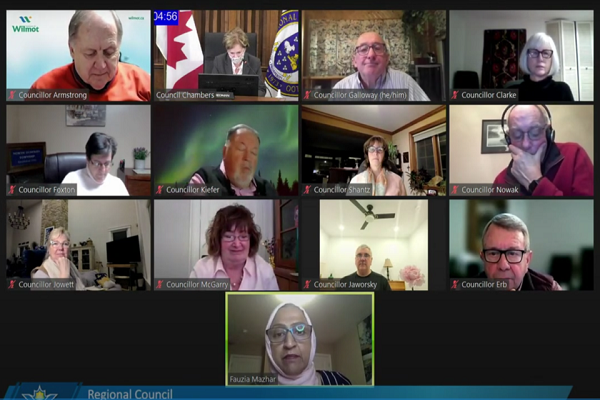Muslim Leader in Waterloo Says Measures to Stop Islamophobia Not Enough

The executive director of the Coalition of Muslim Women of KW says her faith in the region’s commitment to ending Islamophobia was shaken last week when a request to continue funding the organization’s hate crime reporting tool was omitted from a series of recommendations designed to curb the rise of anti-Muslim racism in Waterloo region.
Fauzia Mazhar told regional councillors Wednesday that a series of recommendations aimed at ending Islamophobia in Waterloo region are incomplete and need to be amended to better reflect the input of the Muslim community.
She wants the region to commit long-term funding to the coalition’s Hate and Discrimination Reporting and Support Program which was started last year through a federal funding grant that’s coming to an end March 31.
Since April 2021, reportinghate.ca has processed 87 formal reports, including 82 related to hate and five related to discrimination.
Of those incidents, 54 per cent were reported in Kitchener and 21 per cent in Cambridge.
Most of the incidents occurred in person, while 16 per cent were online incidents.
Of the cases that occurred in person, 30 per cent occurred in residential areas and 18 per cent occurred on the street.
The victim breakdown shows 65 per cent are from the Middle East, 81 per cent are Muslims, 70 per cent wear a religious symbol and 27 per cent asked for help from the coalition.
Islamophobia represented the greatest number of hate incidents at 51 per cent, followed by anti-Asian hate at 22 per cent, Xenophobia at eight per cent and anti-Black racism at three per cent.
The hate crime reporting system was the first of its kind in the region when it was introduced last spring and is designed to fill a gap in reporting non-criminal incidents of hate.
It also offers support to victims and demonstrates the prevalence of racism in the community to help inform ways to prevent it.
The region’s director of strategic communications, Connie MacDonald, assured councillors a proposed annual funding model for the tool will be part of discussions scheduled at the region next week.
Those discussions will be followed up by a recommendation to council next month.
In addition to the funding request, Mazhar wants the region to evaluate if an existing bylaw to ensure the safe and welcoming use of its facilities is effective at stopping racialized attacks from happening.
Mazhar and others in the Muslim community are skeptical it will be effective at stopping incidents of racial harassment on regional property and wanted to see it amended to include better enforcement measures as part of the recommendations.
The region decided enforcement actions can be sufficiently managed under the existing terms of the bylaw.
So, instead she’s asking the region to agree to evaluate enforcement in regional transit facilities and other areas over the next year and make that data public.
Mazhar went on to express her disappointment to councillors with the report in general, explaining that she and other members of the Muslim community don’t feel it is complete without the funding request or the recommended amendments.
Mazhar questioned how the region could involve the Muslim community in the discussion and then exclude them from the decision making process despite leading them to believe their feedback was critical.
“This act of omission and exclusion has shaken my own belief in the region’s public assurances of systemic change and commitment to anti-racism and community safety,” she said.
Mazhar told regional councillors the problem of Islamophobia in Waterloo region isn’t about to go away.
The June 6, 2021 racially-motivated murder of the Afzaal family in London, Ontario prompted Muslim organizations across the country to come up with recommendations municipalities and other levels of government can take to address Islamophobia.
Mazhar said it’s something that’s long overdue.
Since 2017, the lives of 10 Muslim Canadians have been cut short due to hate-related Islamaphobia, she said, adding it “represents only a small symptom of the bigger problem of Islamophobia in Canada, where women like me are targeted on a regular basis.”
“We get taunted, yelled at, spat at, shoved, pushed and punched in public spaces such as parks, parking lots, malls, public transit…public offices and just outside of our homes in our own neighbourhoods.”
Muslim women are targeted in more subtle ways as well, she said, and are often passed over for jobs and promotions, run into difficulty finding housing or accessing services, or get ignored and treated differently while simply running errands in the community.
One of the reasons the Coalition of Muslim Women of KW came to be was the idea that “this sad state of affairs cannot continue,” Mazhar said.
Their vision for the future is a place where “justice, harmony and equity will prevail for everyone.”
Paulina Rodriguez, the region’s equity diversity and inclusion coordinator, told councillors some of the recommendations in the report have already been implemented, including staff training designed to counter Islamophobia and understand implicit bias.
A number of calls to action to stand in support of the Muslim community are also in the works.
On January 29, the region and area municipalities participated in the Green Square Campaign to commemorate the victims of the Quebec City Mosque attack.
Council voted to defer a decision on the recommendations and any amendments until the funding request can be included next month.
Source: Cambridge Today



